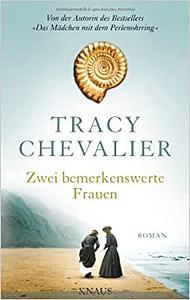You need to sign in or sign up before continuing.
Take a photo of a barcode or cover
Interesting historical novel, especially if you enjoy reading about Georgian/Regency England and/or the history of paleontology.
Working-class girl Mary Anning - one of the main characters in this book - is famous for being the first person to find an entire icthyosaurus skeleton, sparking the idea that perhaps the Earth wasn't created 6,000 years ago (as was commonly believed at the time), and extinct species were entirely possible despite the infallibility of God. Set in pre-darwinian times, I particularly enjoyed these sorts of discussions in the novel.
The other main character is another historical person, fossil enthusiast and middle-class spinster Elizabeth Philpot. I normally don't like the word 'spinster' but in this historical context it is entirely appropriate for an unmarried woman.
I was not, however, entirely convinced by Tracy Chevalier's story. Some of it simply did not ring true to me, though I'm unable to put my finger on exactly what seemed off. Perhaps the attempt at romance between Mary Anning and a visiting fossil collector?
But entirely worth a read - or listen if, like me, you have access to the audiobook.
Working-class girl Mary Anning - one of the main characters in this book - is famous for being the first person to find an entire icthyosaurus skeleton, sparking the idea that perhaps the Earth wasn't created 6,000 years ago (as was commonly believed at the time), and extinct species were entirely possible despite the infallibility of God. Set in pre-darwinian times, I particularly enjoyed these sorts of discussions in the novel.
The other main character is another historical person, fossil enthusiast and middle-class spinster Elizabeth Philpot. I normally don't like the word 'spinster' but in this historical context it is entirely appropriate for an unmarried woman.
I was not, however, entirely convinced by Tracy Chevalier's story. Some of it simply did not ring true to me, though I'm unable to put my finger on exactly what seemed off. Perhaps the attempt at romance between Mary Anning and a visiting fossil collector?
But entirely worth a read - or listen if, like me, you have access to the audiobook.
I wanted to love this because the subject is so interesting (and true!) but the writing and character portrayal just didn’t do it for me.
I thoroughly enjoyed this. I loved the characters. I especially enjoyed the lack of sex scenecs. No historical romantic fiction here!
I didn't realise until the very end that the story was based on a real person. Fascinating insight into life of that time for women.
I didn't realise until the very end that the story was based on a real person. Fascinating insight into life of that time for women.
I had forgotten how good Tracy Chevalier is! While looking for A Single Thread (which I'm now listening to), I found this one at the library and ended up zipping through it. I wish it had illustrations or links--I spent a lot of time looking up the pictures of the stuff Mary found and Elizabeth talked about! Interestingly, on one site there was a request for information about the whereabouts of two of her finds, which are believed to be stashed and forgotten in someone's collection somewhere. It would be so great to find them!
It's a quiet but fascinating story of two women and a lot of fossils, more or less. I loved it!
It's a quiet but fascinating story of two women and a lot of fossils, more or less. I loved it!
This book is beautiful. The depictions of womanhood, female friendships, the intersection of science and religion, all of it is so incredibly written. The characterizations are charming and relatable. I read it in one day, forgot to eat because of it, and plan to read it again and again.
This book is the fictionalized biography of Mary Anning, the "she" in "She sells sea shells by the sea shore." It had to be a fictionalized biography, because no one really knows very much about Mary Anning's lift. For those of you who recognize her name and aren't quite sure why, she's the fossil hunter who found many of the most famous (and earliest) icthyosaurs, pleisiosaurs, and pliosaurs, not to mention hundreds of ammonites, sea lilies, and other ancient marine invertebrates.
"Remarkable Creatures" chronicles Mary Anning's life as well as her friendship with fellow female fossil enthusiast Elizabeth Philpot. Chevalier uses this lens to examine the social mores, expectations, class issues, and sexism of the era in an extremely engaging manner. She explores how unmarried women were judged (and judged themselves) and how social class limited a woman's opportunities. She highlights the unfairness of a scientific world where, if a fossil hunter who was a woman wanted to hear a scientific lecture, she had to sit hidden behind the stage. And a world where an uneducated woman could neither publish in the scientific literature, nor be properly credited for her scientific finds without a fight.
Lots of familiar names crop up, including Lyell and Cuvier. Some of the sections written in Mary's voice are a bit strained, but Chevalier does a good job differentiating amongst many different types of people who are interested in fossils: collectors, hunters, scientists, hobbyists, and trend-followers.
Elizabeth Philpot is probably the highlight of the novel. Her stiff, awkward, self-conscious voice winds through the book, and her journey to self-confidence is wonderful to read.
While this is a work of fiction, Chevalier does not take too many liberties with the story. She does make one conjectural love affair, but she doesn't go overboard with it.
I recommend this book to any paleontology enthusiast, or anyone interested in women in science, or in the science of the period.
"Remarkable Creatures" chronicles Mary Anning's life as well as her friendship with fellow female fossil enthusiast Elizabeth Philpot. Chevalier uses this lens to examine the social mores, expectations, class issues, and sexism of the era in an extremely engaging manner. She explores how unmarried women were judged (and judged themselves) and how social class limited a woman's opportunities. She highlights the unfairness of a scientific world where, if a fossil hunter who was a woman wanted to hear a scientific lecture, she had to sit hidden behind the stage. And a world where an uneducated woman could neither publish in the scientific literature, nor be properly credited for her scientific finds without a fight.
Lots of familiar names crop up, including Lyell and Cuvier. Some of the sections written in Mary's voice are a bit strained, but Chevalier does a good job differentiating amongst many different types of people who are interested in fossils: collectors, hunters, scientists, hobbyists, and trend-followers.
Elizabeth Philpot is probably the highlight of the novel. Her stiff, awkward, self-conscious voice winds through the book, and her journey to self-confidence is wonderful to read.
While this is a work of fiction, Chevalier does not take too many liberties with the story. She does make one conjectural love affair, but she doesn't go overboard with it.
I recommend this book to any paleontology enthusiast, or anyone interested in women in science, or in the science of the period.
I didn't find this as engaging as some of Chevalier's previous books.
There was not a lot of plot or conflict to this book.
It was just okay.
There was not a lot of plot or conflict to this book.
It was just okay.
It's just a lovely story. I honestly just enjoying the writing style, direct and descriptive. I always go to the used book store and pick books at random. I almost never read reviews, synopsis. This way, I'm either utterly appalled or pleasantly surprised, and I was definitely pleased with this book. I had never even heard of many of the events that take place in this story, and I really enjoyed the little look into the life of these women during this time period, their struggles with sexism, marriage, love, poverty. It really was a great and pleasant read.
This is the first Chevalier book I've read - well, actually, I listened to it on CD - and I have mixed feelings. I enjoyed the story and Chevalier's writing style. It was easy to picture the setting and to imagine fossil-hunting with Mary Anning and Elizabeth Philpot. And I was very, very happy to learn that Mary Anning and Elizabeth Philpot actually lived, and that Mary Anning blazed the trails that Chevalier says she did.
I'm torn, though. I'm a purist where history is concerned, so this book made me squirm. Again, Mary Anning was a real person, as were all of the primary characters of Chevalier's novel. I'm uncomfortable with the dramatization of their lives. Lieutenant Birch, who also existed, did, in fact, auction his fossil collection to raise money for the Anning family. But there is no evidence that the two had an affair. In the author's note, Chevalier acknowledges this and says that this is where the fiction writer has to step in. Really? Is it necessary to fictionalize such a significant event in the life of an individual? Or, rather, could Chevalier instead have created fictional characters, modeled after people who lived? It would be, in my opinion, more responsible than dramatizing the already-fascinating life of a living, breathing person.
Okay, so you could certainly call this just a hang-up of mine, and you'd be right. That said, I'll congratulate Chevalier on having written a lovely book, and for having introduced Mary Anning to those of us who did not know her. But if this is the way in which Chevalier comes up with her novels, I don't think I can read any more of them.
I'm torn, though. I'm a purist where history is concerned, so this book made me squirm. Again, Mary Anning was a real person, as were all of the primary characters of Chevalier's novel. I'm uncomfortable with the dramatization of their lives. Lieutenant Birch, who also existed, did, in fact, auction his fossil collection to raise money for the Anning family. But there is no evidence that the two had an affair. In the author's note, Chevalier acknowledges this and says that this is where the fiction writer has to step in. Really? Is it necessary to fictionalize such a significant event in the life of an individual? Or, rather, could Chevalier instead have created fictional characters, modeled after people who lived? It would be, in my opinion, more responsible than dramatizing the already-fascinating life of a living, breathing person.
Okay, so you could certainly call this just a hang-up of mine, and you'd be right. That said, I'll congratulate Chevalier on having written a lovely book, and for having introduced Mary Anning to those of us who did not know her. But if this is the way in which Chevalier comes up with her novels, I don't think I can read any more of them.






